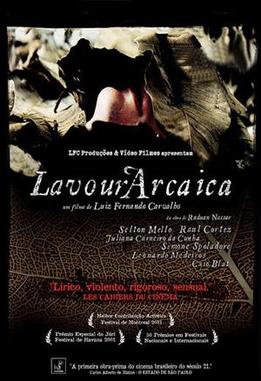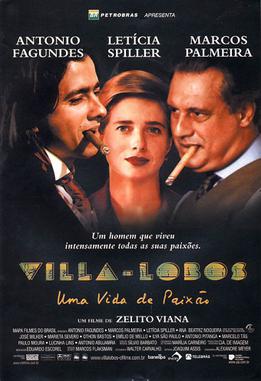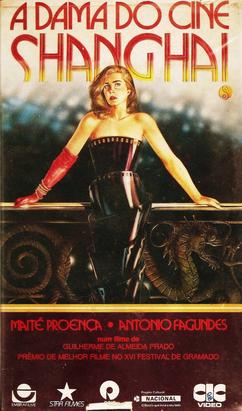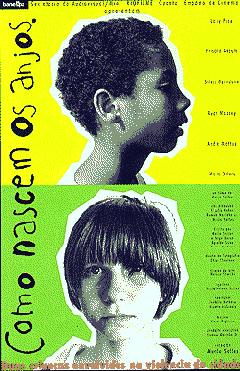
To the Left of the Father is a 2001 Brazilian drama film produced, written, directed and edited by Luiz Fernando Carvalho, based on the novel of the same name by Raduan Nassar. The film follows a man who returns to his father's home after many years and falls in love with his sister. In 2015, the Brazilian Film Critics Association (Abraccine) placed To the Left of the Father among their list of 100 Greatest Brazilian Films of All Time.

Simone Spoladore is a Brazilian actress. Her first film role was Ana in To the Left of the Father.

Brainstorm is a 2000 drama film directed by Laís Bodanzky based on the autobiographical book Canto dos Malditos by Austregésilo Carrano Bueno. The film was made through a partnership between Brazilian and Italian studios and starred Rodrigo Santoro, Othon Bastos and Cassia Kiss. The film tells the story of Neto, a young man who is admitted to a psychiatric hospital after his father discovers he is a user of marijuana. There, Neto is subjected to abuse. In addition to abuse by psychiatric hospitals, the film deals with the issues of drugs and relationships between fathers and sons.

Matheus Nachtergaele is a Brazilian actor, director, and screenwriter.

The Grande Prêmio do Cinema Brasileiro, more popularly known as the Grande Otelo, is a Brazilian film award given annually by the Brazilian Academy of Cinema. It was established in 2000 as the Grande Prêmio Cinema Brasil by the Ministry of Culture of Brazil that presented it in 2000 and 2001. In 2002, the newly established Academia Brasileira de Cinema took on the role of delivering the award which was then renamed to Grande Prêmio do Cinema Brasileiro.

Família Vende Tudo is a 2011 Brazilian film directed by Alain Fresnot.

Villa-Lobos: A Life of Passion is a 2000 Brazilian drama film directed by Zelito Viana. It was entered into the 22nd Moscow International Film Festival. It won the 2nd Grande Prêmio Cinema Brasil for Best Score, and the 5th Brazilian Film Festival of Miami for Best Art Direction. Its production started in 1997 as Villa Lobos - História de Uma Paixão.
The 1st Grande Prêmio Cinema Brasil ceremony, presented by the Ministry of Culture of Brazil, honored the best audiovisual productions of 1999. It took place on February 12, 2000, at the Palácio Quitandinha in the city of Petrópolis, Rio de Janeiro. During the ceremony, the Ministry of Culture presented the Grande Prêmio Cinema Brasil in 17 categories. The ceremony, televised by TV Cultura and Televisão Educativa, was directed by José Possi Neto and hosted by actress Regina Casé.
The 2nd Grande Prêmio Cinema Brasil ceremony, presented by the Ministry of Culture of Brazil, honored the best audiovisual productions of 2000 and took place on February 10, 2001, at the Palácio Quitandinha in the city of Petrópolis, Rio de Janeiro beginning at 8:30 p.m. BRT. During the ceremony, the Ministry of Culture presented the Grande Prêmio Cinema Brasil in 18 categories. The ceremony, televised by TV Cultura and Televisão Educativa, was directed by Bia Lessa and hosted by stylist Felipe Veloso.

Love and Co is a 1998 Brazilian-Portuguese comedy-drama film directed by Helvécio Ratton. Based on Eça de Queiroz's novel Alves & Cia, it stars Marco Nanini, Patricia Pillar and Alexandre Borges. Shot in São João Del Rei, Minas Gerais, and set in the 19th century, it follows Alves (Nanini) as he finds his wife Ludovina (Pillar) with Machado (Borges), and challenges him for a gun duel.

Por Trás do Pano is a 1999 Brazilian comedy-drama film directed by Luiz Villaça. It stars Denise Fraga, Pedro Cardoso, Luís Melo, Ester Góes and Marisa Orth. The plot follows the story of Helena (Fraga), an insecure actress who is married to Marcos (Cardoso), as she receives an invitation to perform in a play alongside the famous actor Sérgio (Melo), who lives a conjugal crisis with his wife Laís (Orth) due to his involvement with his former wife Alexandra (Góes).

Bellini and the Sphinx is 2001 Brazilian crime film directed by Roberto Santucci. Based on Tony Bellotto's homonymous novel, it stars Fabio Assunção as Remo Bellini, a São Paulo-based detective who investigates mysterious murders. It premiered at the 2001 Festival do Rio, where it won the award of Best Film.

The Lady from the Shanghai Cinema is a 1988 Brazilian thriller film directed by Guilherme de Almeida Prado. The film borrows some references from Hollywood films noirs of the 1940s, mainly Orson Welles' The Lady from Shanghai; its name is a play on the title of Welles's film.

José Mayer Drumond is a Brazilian former actor.

Mango Yellow is a 2002 Brazilian drama film directed by Cláudio Assis. It stars Matheus Nachtergaele, Jonas Bloch, Dira Paes, Chico Díaz, and Leona Cavalli as working-class people who engage in amorous and social encounters, with most of the action taking place in a hotel and a bar. The directorial debut of Assis, the film was partially inspired by his previous short film Texas Hotel. It was filmed on a low budget in the suburbs of Pernambuco.

How Angels Are Born is a 1996 Brazilian crime drama film directed by Murilo Salles. It stars Priscila Assum and Silvio Guindane as two Rio de Janeiro favela's children who become involved in the kidnapping of an American man played by Larry Pine. How Angels Are Born has received awards at film festivals, and has been well received by critics.

Ana Luiza Machado da Silva Muylaert, known professionally as Anna Muylaert, is a Brazilian film and television director, producer and screenwriter.

Alê Abreu is a Brazilian film director, screenwriter, character animator, film editor and producer. Sírius, his first short film, debuted at the 1993 Anima Mundi as the only Brazilian animation that year. It won the Best Film Award at the Festival de Cine para Niños y Jovenes and was also screened at the Mostra Internacional de Cinema São Paulo and at the section Animation for Children of the Hiroshima International Animation Festival. His second short film, Espantalho, released in 1998, won the 3rd Best Brazilian Animation at the Anima Mundi, the Best Art Direction Award at the Brazilian Film Festival of Miami, and was nominated for Best Animated Feature at the 1st Grande Prêmio Cinema Brasil. His first feature film, Garoto Cósmico, debuted at the 2007 Anima Mundi. In 2013, at the Ottawa International Animation Festival, he released his second film, Boy and the World. This film became an international success, was nominated at the 88th Academy Awards for Best Animated Feature, and won several prizes, including the Best Feature Film at the Annecy International Animated Film Festival and the Best Animated Feature-Independent at the Annie Awards.
The Grande Prêmio de Cinema Brasileiro for Best Film, given by the Ministry of Culture (2000–2001) and Academia Brasileira de Cinema (2002–present), awards the best film in Brazil.

Exilados do Vulcão is a 2013 Brazilian drama film directed by Paula Gaitán. The film premiered at the 2013 Festival de Brasília.

















